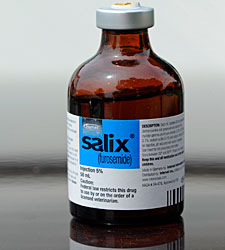Much of the world seems to view horse racing through a different set of binoculars compared to the United States. Racing regulators in Kentucky recently approved a ban on furosemide (brand names Lasix or Salix), long considered a performance-enhancer in thoroughbreds (and thereby banned) throughout much of the world. The proposed phased-in ban, which would halt use of the drug in graded or listed stakes races, still needs approval from state lawmakers – and, as expected, the debate is controversial at best and downright ugly at worst.
Furosemide, the drug at the core of the debate, is a synthetic compound which functions as a powerful diuretic – it’s also the only medication currently allowed to be administered on any given race day in much of the U.S. The medication is used as an anti-bleeding drug to prevent race horses from nosebleeds during races and to treat pulmonary hemorrhaging.
One side of the argument is that a ban would create even more difficulties for an already struggling industry, as the business that gave Kentucky much of its fame has struggled to compete against states where the lure of larger purses is supported by legalized slot machines and the like. Others who are anti-ban suggest that the drug is a less cruel method to prevent or stop bleeding, as presented in “The Case for Using Lasix” in the New York Times.
On the other hand, some argue that banning the drug will boost public opinion of the sport, which has been marred by doping and injuries to both horses and the jockeys who ride them. In an editorial, “Stronger Medicine for What Ails Horse Racing,” the New York Times points out that “this is a good start, but regulators across the country will need to do a lot more to change the industry’s cynical culture, which turns a blind eye to drug use and imposes only wrist-slapping penalties on trainers caught in the act.” Another interesting viewpoint comes from the veterinarian Sid Gustafson, who says: “To allow racing veterinarians in a stall with a horse before a race is to permit doping, as it has turned out in America.”
The World Anti-Doping Agency (WADA) lists furosemide on its banned drug list due to its alleged anti-masking agencies.
